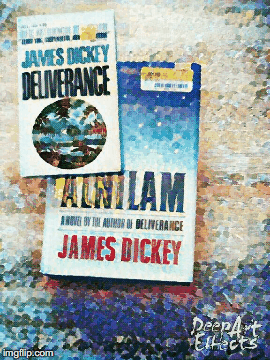Climate change deniers, please consider these words:
This final volume ended with quite a stirring panegyric which I feel compelled to quote in its entirety:
"The more we know of the laws of nature, the more clearly do we understand that every thing which happens in the material world, pestilence, earthquake, famine, or whatever it may be, is the necessary result of something which had previously happened. Cause produces effect, and the effect becomes, in its turn, a cause of other effects. In that operation, we see no gap, and we admit of no pause. To us, the chain is unbroken; the constancy of nature is unviolated. Our minds become habituated to contemplate all physical phenomena as presenting an orderly, uniform, and spontaneous march, and running on in one regular and uninterrupted sequence. This is the scientific view. It is also the religious view. Against it, we have the theological view; but that which has already lost its hold over the intellect of men is now losing its hold over their affections, and is so manifestly perishing, that at present no educated person ventures to defend it, without so limiting and guarding his meaning, as to concede to its opponents nearly every point which is really at issue.
While, however, in regard to the material world, the narrow notions formerly entertained, are, in the most enlightened countries, almost extinct, it must be confessed that, in regard to the moral world, the progress of opinion is less rapid. The same men who believe that Nature is undisturbed by miraculous interposition, refuse to believe that man is equally undisturbed. In the one case, they assert the scientific doctrine of regularity; in the other, they assert the theological doctrine of irregularity. The reason of this difference of opinion is, that the movements of nature are less complex than the movements of man. Being less complex, they are more easily studied, and more quickly understood. Hence we find, that while natural science has long been cultivated, historical science hardly yet exists. Our knowledge of the circumstances which determine the course of mankind, is still so imperfect, and has been so badly digested, that it has produced scarcely any effect on popular ideas. Philosophers, indeed, are aware, that here, as elsewhere, there must be a necessary connexion between even the most remote and dissimilar events. They know that every discrepancy is capable of being reconciled, though we, in the present state of knowledge, may be unequal to the task. This is their faith, and nothing can wean them from it. But the great majority of people have a different faith. They believe that what is unexplained is inexplicable, and that what is inexplicable is supernatural. Science has explained an immense number of physical phenomena, and therefore, even to the vulgar, those phenomena no longer seem supernatural, but are ascribed to natural causes. On the other hand, science has not yet explained the phenomena of history; consequently, the theological spirit lays hold of them, and presses them into its own service. In this way there has arisen that famous and ancient theory, which has received the name of the moral government of the world. It is a high-sounding title, and imposes on many, who, if they examined its pretensions, would never be duped by them. For, like that other notion which we have just considered, it is not only unscientific, but it is eminently irreligious. It is, in fact, an impeachment of one of the noblest attributes of the Deity. It is a slur on the Omniscience of God. It assumes that the fate of nations, instead of being the result of preceding and surrounding events, is specially subject to the control and interference of Providence. It assumes that there are great public emergencies, in which such interference is needed. It assumes, that, without the interference, the course of affairs could not run smoothly; that they would be jangled and out of tune; that the play and harmony of the whole would be incomplete. And thus it is, that the very men who, at one moment, proclaim the Divine Omniscience, do, at the next moment, advocate a theory which reduces that Omniscience to nothing, since it imputes to an All-wise Being, that the scheme of human affairs, of which He must, from the beginning, have foreseen every issue and every consequence, is so weakly contrived as to be liable to be frustrated; that it has not turned out as He could have wished; that it has been baffled by His own creatures, and that, to preserve its integrity, its operations must be tampered with, and its disorders redressed. The great Architect of the universe, the Creator and Designer of all existing things, is likened to some clumsy mechanic, who knows his trade so ill, that he has to be called in to alter the working of his own machine, to supply its deficiencies, to fill up its flaws, and to rectify its errors.
It is time that such unworthy notions should come to an end. It is time that what has long been known to philosophers, should also be known to historians, and that the history of mankind should cease to be troubled by what, to those who are imbued with the scientific spirit, must seem little better than arrant trifling. Of two things, choose one. Either deny the Omniscience of the Creator, or else admit it. If you deny it, you deny what, to my mind at least, is a fundamental truth, and, on these matters, there can be no sympathy between us. But if you admit the Omniscience of God, beware of libelling what you profess to defend. For when you assert what is termed the moral government of the world, you slander Omniscience, inasmuch as you declare that the mechanism of the entire universe, including the actions both of Nature and of Man, planned as it is by Infinite Wisdom, is unequal to its duties, unless that same Wisdom does from time to time interfere with it. You assert, in fact, either that Omniscience has been deceived, or that Omnipotence has been defeated. Surely, they who believe, and whose pride and happiness it is to believe, that there is a Power above all and before all, knowing all and creating all, ought not to fall into such a snare as this. They who, dissatisfied with this little world of sense, seek to raise their minds to something which the senses are unable to grasp, can hardly fail, on deeper reflection, to perceive how coarse and material is that theological prejudice, which ascribes to such a Power the vulgar functions of a temporal ruler, arrays him in the garb of an earthly potentate, and represents him as meddling here and meddling there, uttering threats, inflicting punishments, bestowing rewards. These are base and grovelling conceptions, the offspring of ignorance and of darkness. Such gross and sordid notions are but one remove from actual idolatry. They are the draff and offal of a bygone age, and we will not have them obtruded here. Well suited they were to those old and barbarous times, when men, being unable to refine their ideas, were, therefore, unable to purify their creed. Now, however, they jar upon us; they do not assimilate with other parts of our knowledge; they are incongruous; their concord is gone. Every thing is against them. They stand alone; there is nothing left with which they harmonize. The whole scope and tendency of modern thought force upon our minds conceptions of regularity and of law, to which they are diametrically opposed. Even those who cling to them, do so from the influence of tradition, rather than from complete and unswerving belief. That child-like and unhesitating faith, with which the doctrine of interposition was once received, is succeeded by a cold and lifeless assent, very different from the enthusiasm of former times. Soon, too, this will vanish, and men will cease to be terrified by phantoms which their own ignorance has reared. This age, haply, may not witness the emancipation; but, so surely as the human mind advances, so surely will that emancipation come. It may come quicker than any one expects. For, we are stepping on far and fast. The signs of the time are all around, and they who list may read. The handwriting is on the wall; the fiat has gone forth; the ancient empire shall be subverted; the dominion of superstition, already decaying, shall break away, and crumble into dust; and new life being breathed into the confused and chaotic mass, it shall be clearly seen, that, from the beginning, there has been no discrepancy, no incongruity, no disorder, no interruption, no interference; but that all the events which surround us, even to the furthest limits of the material creation, are but different parts of a single scheme, which is permeated by one glorious principle of universal and undeviating regularity."
They don't make 'em like that anymore, do they?
And with that...
 |
| 482 |
...my reading of Buckle's masterwork comes to an end.

Which does please me, in that it was a Bucket List item...but it also makes me sad, because while there is more Buckle to be had, as previously noted, it is all secondary or tertiary or whatever comes after tertiary stuff. Etcetera. So I might keep on the Buckle path for my Daily Devotional, or I might flip over to something else. All of Buckle's talk about Adam Smith's Wealth of Nations has made me pretty hot for that item, so maybe.... I have a few hours to decide.
Tschüß










































































